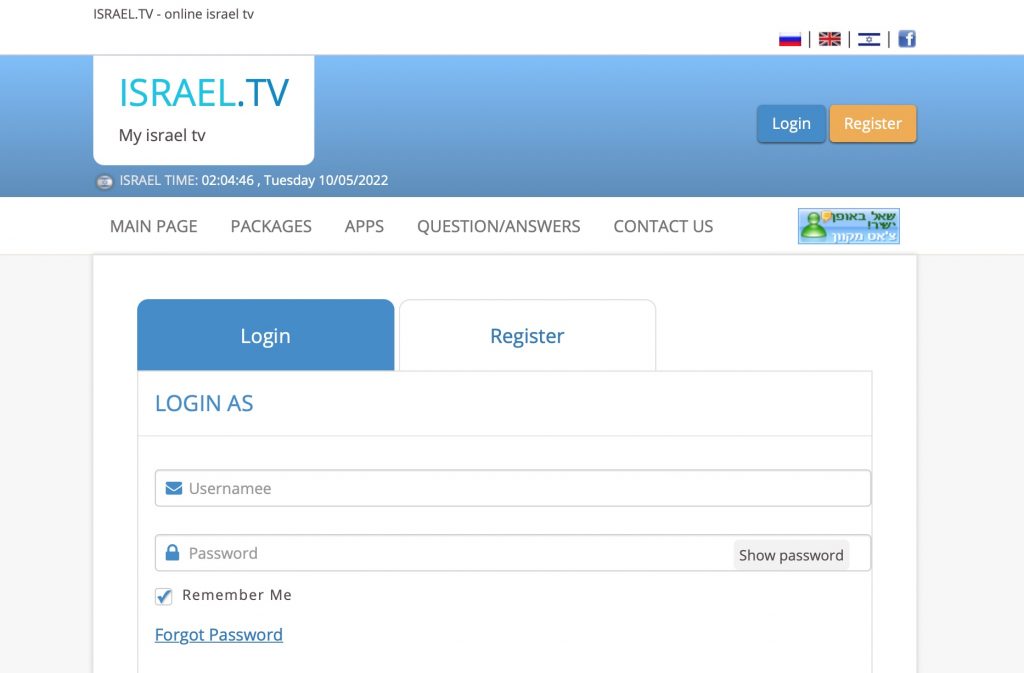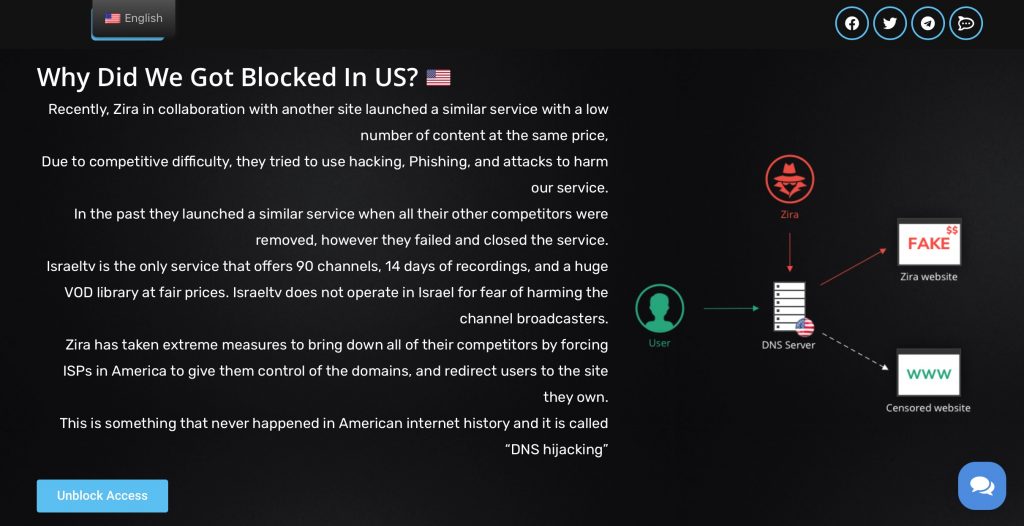Six plaintiffs, United King Film Film Ditribution Ltd., DBS Satellite Services (1998) Ltd., Hot Communication Sytems Ltd., Charlton Ltd., Reshet Media Ltd., and Keshet Broadcasting Ltd., won permanent injunction orders against the operators of three pirate services: Israel.tv, Israeli.tv, and Sdarot.tv. Each of these three were assigned to separate cases/dockets. for Israel.tv and Israeli.tv, but the sdarot.TV case was voluntarily dismissed.
These operations had been rebroadcasting and streaming at least 51 original works that were registered to the plaintiffs – plus at least 273 unregistered works and individual seasons, episodes and sports events – to consumers in the United States, which were authorized for distribution only within Israel.
Orders against the pirates and their distributors
The final judgment awarded statutory damages of $150,000 for each of the 51 registered programs, for a total of $7,650,000 – plus attorney’s fees and costs, for each.
DNS servers of the offending Web sites named in the cases were ordered to be redirected to a landing page operated and controlled by Plaintiffs (the “Landing Page”) which can be reached as follows:
Domain: zira-usa-11024.org
IP Address: 206.41.119.64 (Dedicated)
The Landing Page will include the following information:
On April 26, 2022, in the case of United King Distributors, et al. v. Does 1-10, d/b/a Israel.tv (S.D.N.Y., Case No. 1:21-cv- 11024 (KPF) (RWL)), the U.S. District Court for the Southern District of New York issued an Order to block all access to this website/ service due to copyright infringement
Still in operation?
At least some of the sites identified in these suits were still in operation nearly two weeks after these decisions were handed down. Piracy Monitor found israeltv.com to be running on May 9th.

Another of the sites was running a confusing disclaimer, rather than running the court-ordered message:

Ban on distribution
In addition to paying the monetary damages and implementing the site redirects, the defendants were prohibited from any form of distribution, or further infringement on exclusive rights in the plaintiffs’ works, registered or not, now or in the future, through the past domains, or any other domain in the future, including the ones listed in each of the orders’ Exhibit A – which are lists of domains operated by “Does 1-10” (‘Does’ as in ‘John Doe’) for israel.tv, israeli.tv and sdarot.com respectively.
Orders against all other imaginable partners?
But here’s where these orders seem to break new ground.
First, Exhibit B in each of these cases lists 96 different Internet Service Providers, ranging from national providers to locals. This is an unusual level of detail, in that it identifies virtually every ISP in the United States that’s not an apartment complex, condominium development or private community.
The judgements also have an Exhibit C, which order that third parties providing services used in connection with the defendant’s operations “… block access to the Website at any domain address known today…by any technological means available on the ISPs’ systems,” and that the blocks apply to any changes in the future.
Exhibit C identified 14 companies: Google, Mycloud.my, Facebook, Name.com, Cloudflare, Visa, Mastercard, Roku, Apple App Store, Amazon.com App Store, Joel A. Boyle, Jewella Privacy Service, Inc., Namecheap, Inc., Vocalnet.co.UK
“… but the range of categories of companies listed in Exhibit C raises some eyebrows: “including, without limitation, ISPs, web hosting providers, CDN service providers, DNS service providers, VPN service providers, domain name purchasing service, domain names privacy service, back-end service providers, affiliate program providers, web designers, shippers, search-based online advertising services (such as through-paid inclusion, paid search results, sponsored search results, sponsored links, and Internet keyword advertising), any banks, savings and loan associations, merchant account providers, payment processors and providers, credit card associations, or other financial institutions, including without limitation, PayPal, and any other service provider which has provided services or in the future provides services to Defendants and/or the infringing Website (including without limitation those set forth in the list annexed and made Exhibit C annexed hereto) (each, a “Third Party Service Provider”) — having knowledge of this Order by service, actual notice or otherwise…”
The court decreed that all such third parties “…be and are hereby permanently enjoined from providing services to the Website (through any of the domain names set forth in Exhibit A hereto or at any Newly-Detected Websites).”
Read the Default Judgment and Permanent Injunction Orders:
- Against Israel.tv (Case 1:21-cv-11024-KPF-RWL),
- Against Israeli.tv (Case 1:21-cv-11026-KPF-RWL),
- Against Sdarot.com (Case 1:21-cv-11026-KPF-RWL).
All were filed with the US District Court of the Southern District of New York.
Why it matters
US plaintiffs have been reluctant to pursue site blocking because of two proposals to incorporate site blocking into US copyright law: the Stop Online Piracy Act (SOPA) and the PROTECT IP Act (PIPA); both introduced in 2011. These were highly controversial and were ultimately abandoned.
The israel.tv (et al) judgments have the effect of blocking these pirates from distributing infringing services or infringing instances of content anywhere in the United States. As such, they are similar in effect to judgments that have been won in the recent past by the anti-piracy organizations ACE, IBCAP, and the Motion Picture Association.
But they appear to go further: that they extend to any entity that could possibly enter into a relationship with the pirates, and places the burden of responsibility on those third parties. Other piracy decisions place the burden on the pirate, not on parties that serve them (knowingly or unwittingly).












